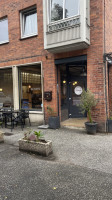Images
ContributeFeedback
Contribute FeedbackFor a long time, the “onni” in the Mühlenstraße was able to claim to be the only purely Korean restaurant in Lübeck’s Old Town. Since 2020, the small local “Hana” has been trying to offer a second alternative right at the beginning of the Krähenstrasse directly at the Mühlenteich. So that’s not true with the translation of “Hana” with “unique” in relation to Korean restaurants in Lübeck, but, of course, culinary can be offered something special. ; Whether this is true and it is indeed a worthwhile alternative, I wanted to try it out for a short visit. Outside view. With regard to the size of the guest room, “onni” has nothing to do with “small and snucky”. Interior view. At right angles there are about 5 table parts around the counter/bar. Most of the imbisses and bakeries have a larger space to offer, so that there is probably a continuing reservation flow that allows the local to exist today: a very good sign. Of course you can also take a seat at the bar on corresponding stools. In the warm months, the small walking distance to the left of the place still offers space for simple plastic furniture that could double the tiny guest capacity from the interior but smoothly. Also in the “Hana” the interior of a very simple, cubic and snorkellessly shaped side without great decoration is shown except a few pot plants. In my opinion, for this small room, one has created the right ambience that lets the guest enjoy the delicacies offered. In the background, young Korean music was running, to which the service lady was funnyly also quietly amazed, but in the long run it was a bit exhausting, but not too loud or monotonous. The fact that the toilet can be found in the basement is less surprising in view of the already small guest room, but is of course still mentioned. However, as in the guest room, the condition and cleanliness could not be affected. The service was in hand by a young Korean woman during my visit. I was greeted not only with a laugh, but also beyond it she radiated beautiful kindness. My questions and order have always been understood by her, so that the language barrier was not in the way. In addition, she was always open to my usual frequent culinary questions about food and would like to ask at the cook. Additional hospitality is also demonstrated in the “Hana” by the fact that a wish explained below has also been given to me in deviation from the menu. So she also contributed to the good hospitality. The size of the menu is as small as the guest room. This actually fits only one DINA4 side of another for beverages and therefore requires no more than one laminated sheet with front and back. The focus is clearly only on Korean cuisine and here only the classics that are most relevant to the cook come to light. In view of this, a higher expected value in terms of freshness and quality is nevertheless quite justified. After two appetizers and in front of a sweet part only referred to as “daily dessert”, the main dishes are selected from the following dishes, which are always obligatory with rice, a soup and three daily supplements. Chicken is at the forefront of fried “Korean Chicken” with a choice of three sauces and “Dakgalbi” as a sharply marinated meat with different vegetables. In the world-famous rice dish “Bibimbap” the guest also has the choice of tofu as a meat alternative, while “Jabche” combines vegetables with Korean sweet potato noodles and is therefore vegetarian from home. All these main foods are priced in a moderate frame between €16 20. My personal interest aroused one of the two appetizers. “Ttoeok Kkochi” were praised for 6 € as a small Korean rice cake in Chili sauce. Since my hunger for a main dish was too low, the appetite for this appetizer alone was too great, I also asked if I could order the obligatory supplements of this also to the rice box extra. Fortunately, I liked to do this and the extra fee of only one merry € is not only PLV but also worth an extralob by service. After 15 minutes, I was then allowed to make up for the following. “Ttoeok Kkochi”: Korean rice cake spears with chilli sauce. Two skewers each with 4 of the sausages-like rice cubes, with their bright red chilis sauces glaze, at least announced an epic taste experience. With the knife they were more difficult to split, they had a more firm, rubber-like consistency. Serving on skewers to bite without cutlery made absolutely sense. For the chewing work, however, the consistency was by no means a tough interpretation. It almost felt like kernel meat, of course without the fiberiness. Nevertheless, the longer duration of stay in the mouth ensured that the marinade could develop properly. The rice cubes themselves, as you know from the Japanese mochi, were more taste-neutral. But the “glazure” really had it aromatic in itself. So I don't mean the expected sharpness, which was very pleasant for the German palate. A basic wort, which clearly suggests soy, had a sweet touch, which is nothing strange in Asian dishes. The truly unique with which we would be once again at the “Hana” translation was a 4th flavor component: a smoke reminiscent of BBQ. All these facets were so well balanced that nothing else could arise as a good taste. Yes, for me it was something exciting new, but also unique. 4 Korean supplements: cucumbers, Kohlrabi, Kimchi and soup. The Korean side dishes served in small bowls included a four-fold. This naturally began with “Kimchi”, i.e. the world-famous, fermented cabbage preparation. This already convinced with beautiful bite, as well as especially with the typical sharpness, which however came very pleasantly dosed. Fine strips of Kohlrabi with a little black sesame were not only crisp, but also cleaned the taste buds with a fresh acid. In the third shell, the pieces of dekerned cucumber with some carrot rasps did not miss a fresh tackiness. This smallness also surprised again with a tasteful intrinsicity, which here produced a special nutty salty flavor compound by a marinade of soy sauce and especially roasted sesame oil. The supplements were completed with a soup, which also remained purely vegetarian, because it was a vegetable broth with a stocked egg clear and not chicken puffs, as I thought. As a warm component, this added to the supplements the still missing part, which made this reige a really diverse companion I would not have forgot. In conclusion, for evaluation, I must also draw a comparison with the previous “Platzhirsch” in Lübeck’s Korean gastronomy called “onni”. Purely atmospheric, both locals take nothing for me and with simple but modern furnishings make the best of the limited space available, which is clearly smaller here in the “Hana”. This is how the lovingly meant predicate “snuckling” deserves absolutely. In theory, this low guest capacity enables a more individual and attentive service. During this visit, the former was already filled by the fulfillment of my supplements to my ordered appetizer. In addition, the friendliness and affluent openness of the young woman also produced nothing but joyfulness in me. Culinaryly, the team of the “Hana” showed me with all the small things that I've been able to get here really something unique in Lübeck. Not only the small rice cubes in their marinade, but even the in German kitchens often presented so many facets, which in total were finely tuned and balanced both in taste and consistency. 6 € for the appetizer and only a symbolic € for the extra supplements were therefore perhaps primarily no saturation investment, but more than rewarding for the tasteful journey in otherwise completely unfamiliar worlds. So the “Hana” has rightly held itself for me as the second Korean restaurant in the city center to this day and for me qualitatively showed no smears compared to “onni”. In contrast to the now very violent relatives in the busy Mühlenstrasse, it is much more to be regarded as a small secret tip and offers Korean food that has been found here so far. The “Hana” may not call itself a “unique” Korean offer here in Lübeck, but for me it is quite “unique” good.
Full Menu
Download MenuMore information
QR-code link to the menu








